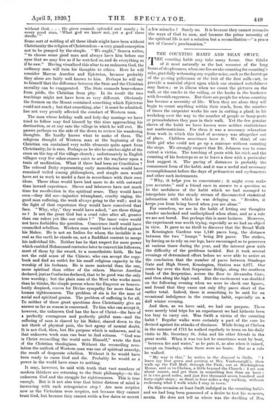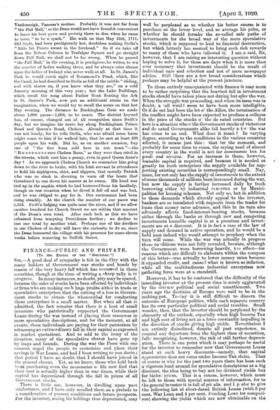T THE COUNTING HABIT AND DEAN SWIFT. HE counting habit may
take many forms. One thinks of it most naturally as the last resource of the long hours of sleeplessness, when one lies awake counting for counting's sake, gratefully welcoming any regular noise, such as the footsteps
of the passing policeman or the trot of the first milk-cart, to provide a material object upon which our strained wakefulness may fasten ; or in illness when we count the pictures on the wall, or the cracks in the ceiling, or the books in the bookcase with feverish eagerness. But there are people for whom counting has become a necessity of life.. When they are alone they will begin to count anything within their reach, from the number of times the carpenter works his saw in cutting a plank in his workshop over the way to the number of people or lamp-posts or perambulators they pass in their walk. Yet the few genuine slaves of the habit we have known were neither statisticians nor mathematicians. For them it was a necessary relaxation from work in which this kind of accuracy was altogether out of place. Children sometimes have it. We think of one little girl who could not go up a staircase without counting the steps. We strongly suspect that Dr. Johnson was to some extent a victim. The touching of posts with his stick and tho counting of his footsteps so as to leave a door with a particular foot suggest it. The pacing of distances is probably tho commonest form of the habit, and it was a useful and necessary accomplishment before the days of pedometers and cyclometers and other such instruments.
"Why, it helps you to concentrate ; it might even make you accurate," said a friend once in answer to a question as to the usefulness of the habit which we had managed to interpolate into the steady stream of disconnected statistical information with which he was deluging us. "Besides, it keeps you from being bored when you are alone."
For ourselves, we are in the habit of letting our thoughts wander unchecked and undisciplined when alone, and as a rule we are not bored. But perhaps this is mere laziness. However, the experiment was worth trying, especially as we had an object in view. It gave us no thrill to discover that the Broad Walk in Kensington Gardens was 1,140 paces long, the distance between the two " humps " being 204 paces. The strikes, by forcing us to rely on our legs, have encouraged us to persevere at various times during the year, and the interest grew with
the difficulty of the problems tackled. But it took several evenings of determined effort before we were able to arrive at the conclusion that the number of paces between Stanhope Gate and High Street, Kensington, Station was 4,077. Our route lay over the first Serpentine Bridge, along the southern bank of the Serpentine, across the Row to Alexandra Gate, and then along the high road. But the excitement was doubled on the following evening when we were to check our figures, and found that they came out only fifty paces short of the earlier total. Indeed, there is something to be said for an occasional indulgence in the counting habit, especially on a
dull winter evening.
And then, as we have said, we had our purpose. These were merely trial trips for an experiment we had hitherto been too lazy to carry out. Was Swift a victim of the counting habit ? Regular walks were certainly a part of the cure he devised against his attacks of dizziness. While living at Chelsea in the summer of 1711 he walked regularly to town on his daily visits to Mr. Secretary St. John and his other friends in the great world. When it was too hot he sometimes wont by boat, "between fire and water," as he puts it, as also when it rained, except on Sundays, when there were no boats. But as a rule he walked.
"My way is this," be writes in the Journal to Stella. "I leave my best gown and periwig at Mrs. Vanhomrigh's, then walk up the Pall Mall, through the Park, out at Buckingham House, and so to Chelsea, a little beyond the Church : I set out about sunset, and get there in something less than an hour : it is two good miles, and just five thousand seven hundred and forty-eight steps ; so there is four miles a day walking, without reckoning what I walk while I stay in town."
On this occasion at least Swift indulged in the counting habit- and we had long been possessed of a desire to test his measure, meats. He does not tell us where was the dwelling of Mrs.
Vanhomrigh, Vanessa's mother. Probably it was not far from "the Pall Mall," or the Dean would not have found it convenient to leave his best gown and periwig there to don when he came to town "to be a spark." His walk on that May 15th, 1711, Old Style, had been prodigiously hot, doubtless making Stella's "little fat Presto sweat in the forehead." So if we take off from the Nelson Column in Trafalgar Square and go straight down Pall Mall, we shall not be far wrong. When he passed "the Pall Mall," in the evening, it is prodigious, he writes, to see the number of ladies walking there, and he always cries shame upon the ladies of Ireland who never walk at all. In St. James's Park he would catch sight of Rosamond's Pond, which, like the Canal, he had described to Stella as full of the rabble " and with skates on, if you know what they are," on a cold January morning of this very year ; but the Lake Buildings, which recall the song about Father Noah floating the Ark in St. James's Park, now put an additional strain on the imagination, when we would try to recall the scene on that hot May evening. The distance to Buckingham Gate we made about 1,600 paces-1,608, to be exact. The district beyond has, of course, changed out of all recognition since Swift's day, but we imagine his route lay along Buckingham Palace Road and Queen's Road, Chelsea. Already at that time it was not lonely, for he tells Stella, who was afraid some harm might come to him if he walked late, that he met at least 500 people upon his walk. Did he, as on another occasion, buy one of "the fine buns sold here in out town "—the " Chelsea Runs," as they were then cried in the streets, which cost him a penny, even in good Queen Anne's day ? As we approach Chelsea Church we remember him going down to the river to bathe, with his Irish servant in attendance to hold his nightgown, shirt, and slippers, that rascally Patrick who was so slack in shouting to warn off the boats that threatened to run down his master as he swam. His head was tied up in the napkin whir& he had borrowed from his landlady, though on one occasion when he dived it fell off and was lost, and he was obliged to pay for it. Our excitement had been rising steadily. At the church the number of our paces was 5,553. Swift's lodging was quite near the river, and if we allow another hundred for Church Street we are within that amount of the Dean's own total. After such luck as this we have refrained from tempting Providenoe further ; we decline to test our total by another trial. Perhaps one of the dwellers in our Chelsea of to-day will have the curiosity to do so, since the Dean honoured the village with his presence for some eleven weeks before removing to Suffolk Street.



































 Previous page
Previous page